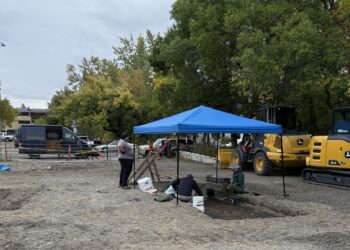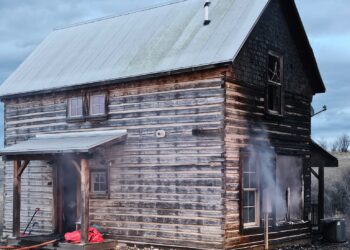Local grassroots organization hosts BIPOC scholarship in Big Sky
By Gabrielle Gasser ASSOCIATE EDITOR
Correction: A previous version of this story referred to the organization Women of Winter as a nonprofit. At this time, the grassroots organization has not filed as a group with nonprofit status, but representatives say they are planning to file in the near future.
BIG SKY – The smiles were wide and the excitement was palpable as six women practiced side-slipping down Tippy’s Tumble at Big Sky Resort to better understand one of the five fundamentals of skiing. Though they were prepping for an Alpine Level I exam, these women were still able to have some fun and enjoy each other’s company as they asked questions, swapped stories and learned what it takes to teach a ski lesson.
These women were part of a cohort of 12 Black women, Indigenous women and other women of color to receive scholarships from local grassroots organization Women of Winter and the Professional Ski Instructors of America and American Association of Snowboard Instructors to obtain their PSIA-AASI Alpine or Snowboard Level I certification at Big Sky Resort this month. Between March 5-8, these six skiers and six riders completed two prep days and two exam days.
The Women of Winter BIPOC PSIA-AASI Level 1 Course and Exam Scholarship program started last season as an Alpine Level I scholarship with the help of the PSIA-AASI Northern Rocky Mountain Division. Women of Winter Founder Chris Walch saw a need for a space where women in snow sports could own their education. She named several reasons why this scholarship is important including creating community, providing education and breaking barriers to entry.

This season, the program awarded a total of 30 scholarships for the Level 1 course and exam completed across four different resorts.
“We had that first crew of six women at Big Sky last year, all women of color, and it was really transformational for them,” Walch said. “Almost all of them said that that was the first time they’d ever been in a group of just women of color and having it be where they didn’t have to explain themselves.”

According to a PSIA-AASI Member Survey Report from 2020, 87 percent of the organization’s membership was Caucasian/white, and 70 percent of the membership was male. Representation of each of the other races and ethnicities, male and female, was reported at 2 percent or lower.
“Hosting the Women of Winter program is a small, but important, piece in increasing inclusivity in snow sports,” wrote Christine Baker, vice president of mountain sports at Big Sky Resort in an email to EBS. “It’s a ripple effect—each participant improves skills and creates connections which they will use going forward to bring (and keep) more BIPOC women into snow sports.”
This year’s recipients were fully equipped with necessary gear, lift tickets and female examiners.
“These women are awesome, because they’re all changemakers, they’re all leaders,” Walch said, “and so by giving this opportunity, I think it’s going to be really exciting because they’re going to bring that level of motivation and energy into snow sports.”

On the snow on March 6, the stoke was high as six women and their PSIA alpine instructor, Shelby Rogala, worked through the five fundamentals of skiing.
“It’s really nice to learn in this space because I feel like you can really be vulnerable,” said participant Julia Syi. “…You can really just focus on learning; you don’t have to prove yourself or maintain a certain presentation…I think it’s a good space to grow.”
Women of Winter was born in the winter of 2018 when Walch, who ski instructs at the Yellowstone Club, stood at her locker talking with two talented women who were carving their own paths through the snow sports industry. She became inspired to put on a talk that featured stories of women who didn’t follow traditional paths and instead paved their own way.
From there, her idea bloomed into a grassroots organization with the mission of empowering women to get outside and follow their own paths.
“We realized there was a need in the community, like a hunger in the community, for these stories of women that are really dominating in a sport where they’re not front and center all the time or where they’re not a huge part of the demographic,” Walch said.
Now in its fourth year, Women of Winter has expanded to offering three different scholarships and has touched the lives of women across the country. Not only have the scholarship opportunities provided education and the ability for more women of color to enter the snow sports industry, but they have also created lasting bonds and community that recipients value long after clicking out of their skis.

All but one of the scholarship recipients from last year returned to Big Sky this year to reunite and meet the new cohort.
“We would have never imagined that a group of strangers would be able to come together from all over the country and be able to really form a bond that’s as solid as ours,” said Bree Jameson, a recipient from last year.
Hailing from Texas, Jameson, a mother of 11-year-old twins, started her own community initiative called MORE outside. Minorities in Outdoor Recreation and Education seeks to reduce the barriers that prevent women and people of color from accessing the outdoors.
She applied to the Women of Winter scholarship to further her mission.
“Being in a learning environment with folks that are teaching you, that understand where you’ve been and where you’re going to go,” said Jameson, “and then being surrounded by others that come from all different walks of life, but all still face some of the same obstacles and access barriers to access all of those things was just so amazing.”
Another scholarship alumna, Alyssa Gonzalez, returned as well and now serves as the diversity, equity and inclusion and communications lead for Women of Winter.
Walch says she hopes the women participating in these scholarships find community and gain a valuable education which they can then share with others.
“Our main goal is to make snow sports as welcoming and as inclusive and as equitable as possible,” Walch said. “For me, that really means bringing leaders in that can help with that change because the more of us there are that are pushing for it, the harder it is for us to ignore. And it can’t just be a small crew doing it there needs to be a lot of us really trying to affect change.”

During the last chairlift ride before lunch, half of the scholarship class discussed their upcoming exam and everything they’d already learned in the whirlwind prep days. The women agreed that this opportunity will be a game-changer as more women of color are represented in the mountains.
“I value all of the knowledge and experience that has come together with women that look like me, that are women that have similarities,” said participant Yolanda Carlton. “And our commonality is we’re all women of color, black, indigenous people of color that want to see more inclusion and diversity on the mountain.”
She added that she’ll be able to bring what she’s learned back to her own community in Washington D.C. and show her friends and family that they too belong in the mountains.














